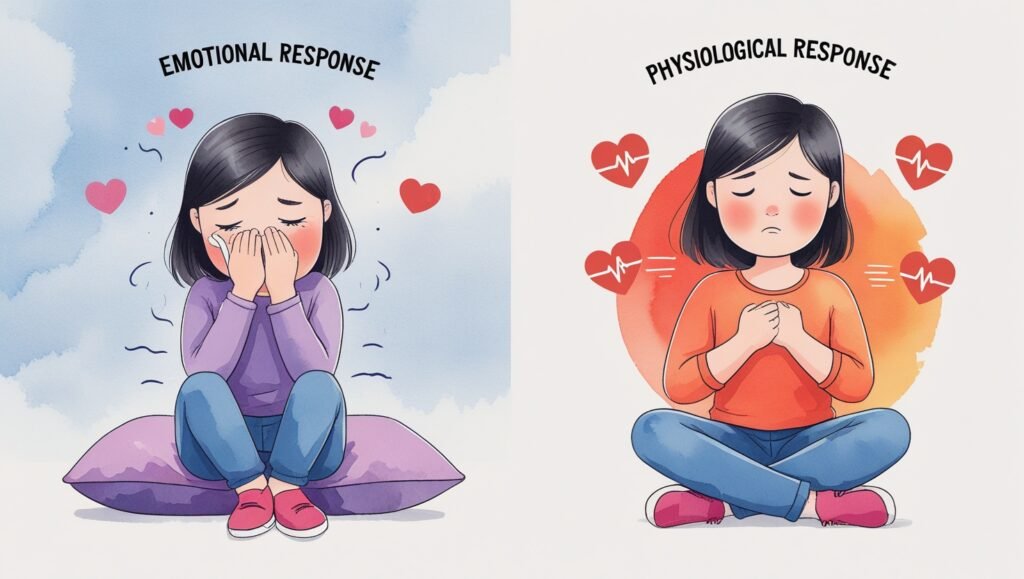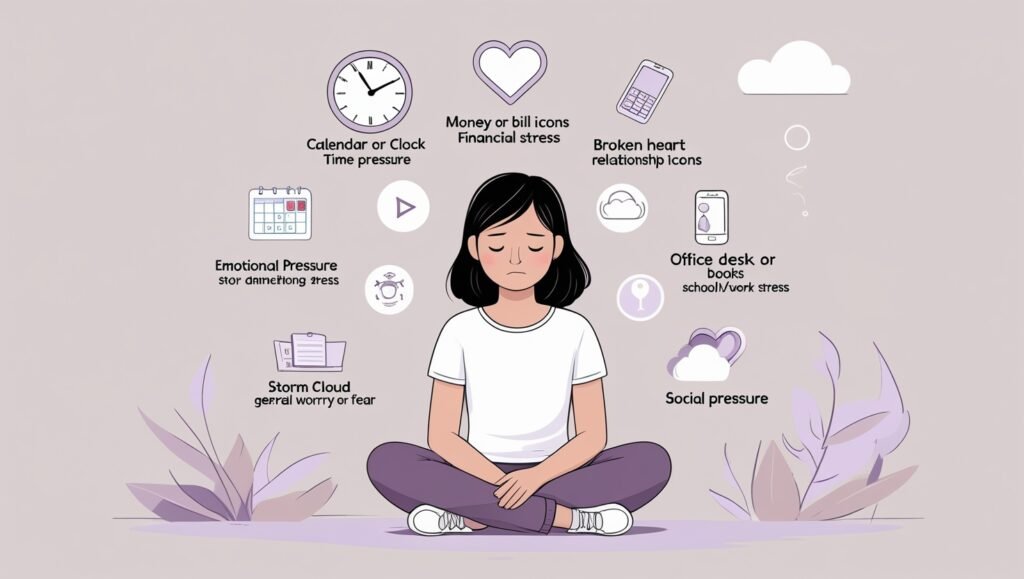Overthinking vs Anxiety: What’s the Real Difference?
In a world that is hyperstimulating — populated by social media alerts, workplace deadlines and family obligations — little wonder, then, so many of us feel strained in our minds. Perhaps you’ve repeatedly replayed a conversation in your mind, worrying that you had said the wrong thing, or had a knot in your stomach before a big meeting.
But are these instances of overthinking or indications of anxiety? Though the two concepts share some similarities, overthinking and anxiety are two separate experiences with varying causes and symptoms, as well as different impacts on your life.
Knowing the difference between overthinking and anxiety is key for taking charge of your mental health and choosing the paths that are not only right for you and beneficial for others, but that allow for serenity and peace.
In this definitive guide, we’re going to dissect the definitions, symptoms and causes; compare the effects; and give you actionable strategies to manage both types of disorders. Whether you’re in the midst of a repetitive mental cycle or are overwhelmed by ongoing anxiety, this story will give you clarity and a game plan.
What is Overthinking?

To over-think is to spend too much time pondering or stewing about something- a thought, a situation, or a decision, and it is equally too much time and time spent in frustration. It’s as if your brain is caught in a loop, repeating scenarios, rehashing details or imagining endless “what-ifs.” Unlike anxiety, overthinking is not defined as a mental health disorder, but is a way of thinking or cognitive process that can lead to anxiety due to an inability to make a decision or take action.
Overthinking Types of Overthinking
Overthinking shows up in a couple of distinctive forms:
- Repetitive Thought Patterns You might constantly replay a conversation from days ago, breaking down every word after word as if you could figure out if you had offended someone.
- Pay Attention to Uncontrollable Factors: Overthinkers tend to get stuck on things they can’t change, such as what others think of them.
- Indecision: Being afraid to make the wrong choice, you may spend a hour or days mulling over decisions, even minor ones.
- Mental and Emotional Exhaustion: That incessant inner monologue is exhausting, causing you to lack the energy to concentrate on your to-do list, or to enjoy the present.
- Second Guessing: Those who think too much are often hesitant about what they do, considering if there was a better way.
Real Life Example of Overthinking
Visualize that you are getting ready for a job interview. You dedicate hours to researching the company, rehearsing responses and envisioning every question that might be asked. You replays every answer in your head after the interview, questioning whether you sounded sure enough, or whether you worded something incorrectly. You were great, but you can’t shake a single awkward moment, and it’s 3 a.m. and you’ve been up for hours. This is you overanalyzing — you’re obsessing on a single incident until you can’t stop picking it apart.
Why Overthinking Happens
Over-analysis typically comes from a place of trying to control a result or avoid a mistake. It’s typical in people who are perfectionists, who have low self-esteem and who are facing high-pressure situations. A student might overthink a test question, dedicating so much time to one problem that he runs out of time for the rest of the test.
What is Anxiety?

Anxiety is a mood disorder where one has too much fear or worry that is constant, uncontrollable, and intrudes on one\’s routine. It is a natural reaction to stress — your body’s way of preparing for threats that might emerge — but when anxiety becomes chronic or overwhelming, it can get in the way of your daily life. Mental Disorders Anxiety disorders, such as GAD, social anxiety disorder, or panic disorder, they are a recognized mental illness in DSM-5 and typically need professional treatment.
Characteristics of Anxiety
Anxiety comes with both mental and physical symptoms, which can be: emotional, cognitive, and physical:
What You Feel: A speeding heart, clammy hands, trembling, shortness of breath, stomach problems (nausea among them) are all very routine.
Emotional Distress: You may feel a fear, anger, or doomed feeling overtaking you.
Persistent Worry: Instead of overthinking which deals with over a specific matter, anxiety is the feelings that people often have that they are worrying about every aspect of their life such as their health, money, work and relationships.
Avoidance Behaviors: Anxious individuals often avoid situations that bring about their fears, such as public speaking and social situations, or even the simple act of leaving the house.
Hypervigilance: As anxiety heightens the alert, you may think you are surrounded by danger even when you are safe.
Real-Life Example of Anxiety
Imagine that: You’re invited to your friend’s party and the prospect of going makes you feel miserable. Your heart pounds, your palms sweat and you agonize over everything from what you will say to how you will be judged. You might also back out at the last minute to escape the awkwardness. It’s not just overanalyzing the incident — it’s anxiety, and it is affecting you both physically and emotionally, and it is now driving your behavior.
Types of Anxiety Disorders
Anxiety isn’t a monolithic condition, and descriptions vary: Broadly speaking, it is a feeling of worry and fear, as we all know, but one so severe that it affects our daily lives and relationships. Anxiety disorders that are most commonly diagnosed are:
- Generalized Anxiety Disorder (GAD): Chronic anxiety about multiple areas in life, and lacking a specific trigger.
- Social Anxiety Disorder: Overwhelming fear of social situations or what others think of them.
- Panic Disorder: Repeated panic attacks, sudden attacks of intense fear along with physical symptoms.
- Obsessive-Compulsive Disorder (OCD): Unwanted thoughts (obsessions) and rituals (compulsions) to prevent anxiety.
- Post-traumatic Stress Disorder (PTSD): Anxiety resulting from past traumatic experiences.
Key Differences Between Overthinking and Anxiety
While overthinking and anxiety both involve excessive worry, they differ in scope, impact, and underlying mechanisms. Here’s a detailed comparison to clarify their distinctions:
| Aspect | Overthinking | Anxiety |
|---|---|---|
| Definition | Excessive, repetitive thinking about a specific issue or scenario. | A mental health condition involving persistent, excessive worry and fear. |
| Nature | Cognitive habit, not a diagnosed condition. | Clinical condition recognized in the DSM-5. |
| Symptoms | Mental rumination, indecisiveness, mental fatigue. | Physical symptoms (e.g., racing heart), emotional distress, avoidance behaviors. |
| Scope | Focused on specific events or decisions. | Generalized worry across multiple areas of life. |
| Duration | Temporary and situation-specific. | Chronic, often lasting months or years. |
| Impact | Causes stress, indecision, or reduced productivity. | Can significantly impair daily functioning, relationships, and quality of life. |
| Treatment | Self-help strategies like mindfulness or journaling. | May require therapy, medication, or professional intervention. |
| Triggers | Specific situations, like a work project or social interaction. | Often vague |
Emotional vs. Physiological
Overthinking is predominantly a cognitive process, limited to repeated thought and analysis. Anxiety, on the other hand, is a mental as well as a physical response. For example, an overthinker might agonize over a work email and worry whether it sounded professional, while someone with anxiety might feel their heart race and sense a moment of panic thinking about sending the same email.

Situational vs. Chronic
Ruminating has a specific reference, for example a presentation or occupation. What will happen here, when the current problem is over, is the obsessing will mostly go away. Anxiety, on the other hand, can last no matter the situation, lingering for weeks, months, or years.
Control and Resolution
Ruminating is often something you can get a handle on with tactics such as mindfulness or by learning to reframe thoughts. Anxiety, and especially anxiety as a disorder, can have to do with your nervous system or chemical balance in your brain that a professional should help treat with therapy or a prescription.
Causes of Overthinking and Anxiety
Knowing what’s causing your overthinking and anxiety can help pinpoint which you may be experiencing and what to do about it.
Causes of Overthinking
Perfectionism: The compulsion to make everything “right” can lead to intellectualizing everything.
Low Self-Esteem: If you do not have confidence in yourself or feel like you deserve anything, then you will have repetitive negative thoughts about times you believe you have failed.
Stressful Situations: High-risk situations, such as job interviews or relationship disagreements, may also stimulate overthinking.
Loss of Decision-Making Confidence: Uncertainty of decision-making could result in mental loops as you decide on every possible option.
Cultural/Social Pressure: Fear of judgment or social expectations (success) can motivate overthinking.
Example: A writer may spin his wheels on a blog post, perfecting a single sentence for hours because he fears being criticized.
Causes of Anxiety
Genetics: You’re at a higher risk if anxiety disorders run in your family. Anxiety disorder has been found to have a moderately strong heritability component.
Brain Chemistry: A shift in brain chemistry that involves levels of the neurotransmitters serotonin, dopamine or GABA can all contribute to symptoms of anxiousness.
Trauma or Stress: Previous experiences, like early childhood trauma and chronic stress, can induce or worsen anxiety.
Environmental Factors: Stressful situations that continue over a significant period of time can contribute to anxiety such as financial instability, work pressure, or relationship issues.
Medical issues: Anxiety can be a symptom of health problems such as thyroid conditions, heart problems and chronic pain.
Illustration: An individual with a family history of anxiety may suffer from persistent health anxiety even after a doctor gives a clean bill of health, due to genetic susceptibility and increased stress responses.

How Overthinking and Anxiety Interact
Overthinking and anxiety are not separate entities; they tend to fuel each other exacerbating their revolting circle. For example: overanalyzing a small mistake at work (e.g., “Did I come across as rude during that meeting?” can evolve into broadbased anxiety about job security or ability to perform. The physical aspects of anxiety, such as a beating heart, can make overthinking feel more urgent, as your body alerts you to a threat.
On the contrary, overthinking can be exacerbated by anxiety, where one finds it difficult to get out of the loop of repetitive thinking. The emotional response that anxiety causes can make each of your worries feel catastrophic, and that may lead to more ruminating.
The Vicious Cycle
Here’s how it works:
- Overthinking Starts: You start ruminating on one specific issue (for instance, an argument with a friend).
- Anxiety Kicks In: The relentless fixation on it gives way to physical symptoms, such as a tight chest or racing thoughts.
- Escalation: The physical symptoms raise the stakes, making the problem feel more threatening, and that leads to more overthinking.
- Avoidance Or Paralysis: You may also avoid the issue or fall into a paralysis of indecision, thus feeding the cycle that much more.
How to Identify If You’re Overthinking or Experiencing Anxiety
It can be difficult to distinguish overthinking and anxiety, because they have many overlapping symptoms like constant worry and non-stop mental preoccupation. Here are a few questions to help you identify which one yours is:
Is your anxiety narrow or broad?
- Overthinking: Centered on something tangible, such as a recent conversation or decision.
- Anxiety: General, generalized across many life areas (such as health, finances, relationships).
Does your patient have physical symptoms?
- Overthinking: The symptoms are largely mental (unless overthinking leads you to overeat or lose sleep).
- Stress: Combines elements of all of the above, but focused on symptoms such as racing heart, sweating, or tremors.
How long does the worry last?
- Overthinking: Generally temporary, situational.
- Anxiety: Pervasive, lasting weeks or months and seemingly without a trigger.
How much does it interfere with your daily life?
- Overthinking: Might lead to frustration or indecision, but usually doesn’t shut down day-to-day functioning.
- Anxiety: Can devastate work, relationships, sleep, or socializing.
Self-Assessment Tool
Documentation Keep a journal for observations taken over the course of one week of:
- What prompts your concerns (specific incidents or general worries).
- This includes any physical symptoms (eg, heart palpitations or tension).
- How long the worry lasts and what it does to your day.
If you consistently have excessive worry, physical symptoms or significant life disruption, it could be anxiety, not overthinking. Seek a diagnosis from a licensed mental health provider.
Strategies to Manage Overthinking
Practical self-help strategies can help to ease overthinking. Here are evidence-based ways to escape the mental loop:
Practice Mindfulness
Practicing mindfulness means being here in the moment, keeping the thoughts coming without judgment. Studies have found that mindfulness-based interventions can decrease rumination up to 30%.
How to Get Started: Give a 5-minute guided meditation such as those found on the Headspace or Insight Timer apps a try. Return to your breath, and kindly steer your mind away when it drifts.
Example: If you’re overthinking an email you have to write for work, stop and take 10 deep breaths, focusing on the feeling of your breath to stay grounded.
Set a “Worry Time”
Schedule a time to think about your concerns every day. Jot down your concerns and delegate some time for brainstorming potential solutions at this time. If it is not this time, change the subject of your thoughts to something else.
How to Do It: Allocate 10–15 minutes, preferably in the evening, to jot down your concerns. If worries come up earlier in the day, jot them down and set aside time for worrying later.
Example: If you’re overthinking a presentation, write down your worries, and read them at worry time, and then turn your attention to other tasks.
Challenge Negative Thoughts
Overthinking often includes cognitive distortions, such as catastrophizing (expecting the worst-case scenario) or overgeneralizing (believing that one mistake condemns you). Apply cognitive-behavioral strategies to challenge these thoughts.
How to Do It: Ask yourself:
- “What proof is there for this thought?”
- “What are you basing that on, what evidence are you using to contradict that?”
- “Would I say the same thing to a friend in this situation?”
Example: If you’re concerned you bombed an interview, make a list of your preparation and strengths to counter the negative narrative.
Engage in Problem-Solving
If your overthinking is due to an issue that can be resolved, concentrate on actionable steps. Divide the problem into smaller pieces and attack them separately.
Example: If you’re overthinking a work project, make a to-do list, prioritize tasks and give deadlines to regain a sense of control.
Limit Decision Fatigue
We are more given to overthinking when decisions are involved, and we are more prone to decisions when there are too many choices. Simplify choices by laying out criteria or narrowing options.
Example: If you’re wasting time overthinking what to wear, curate a choice of two outfits the night before and eliminate unnecessary morning anxiety.
Mindfully Distract Yourself
Doing things that keep your mind occupied, such as reading, exercising or working, can also help you break the cycle of overthinking.
Example: If you keep thinking about a recent social interaction, go for a walk or listen to a podcast to change gears.
Strategies to Manage Anxiety

For diagnosed anxiety disorders, much more than self-help strategies are needed just to be clear. Here are strategies that work:
Cognitive-behavioral therapy mentality (CBT)
CBT is the best evidence-based treatment for anxiety disorders and has been found to alleviate symptoms in 50-75% of patients. It enables you to recognize and rework negative thought patterns.
How to Get It: Collaborate with a licensed therapist face to face, or via online providers as BetterHelp or Talkspace. Many have CBT-based workouts available online.
Example: If you’re worried that you’re the center of attention when you’re not, a therapist can help you challenge the belief that “everyone is judging me” by looking at the evidence from previous social interactions.
Medication
SSRIs and benzodiazepines can be used for moderate to severe anxiety.
Note: This page contains side effects data for the generic drug gabapentin. Never begin or discontinue medication without physician guidance.
Lifestyle Changes
Some behavior can help you in minimizing symptoms of anxiety:
Exercise: Moderate exercise, such as 30 minutes of walking or yoga, decreases cortisol levels and stimulates endorphins.
Sleep: Make sure you get 7-9 hours of quality, restful sleep to help regulate emotions. And steer clear of screens if you read in bed, for better sleep.
Diet: Limit caffeine and sugar, which can have similar or exacerbate existing anxiety symptoms. Include omega-3-rich foods such as salmon to promote brain health.
Breathing Exercises
- Deep breath slows down the nervous system and decreases body tension associated with anxiety.
- Try This: Breathe using 4-7-8 method: Inhale for 4 seconds, hold breath for 7 seconds, exhale for 8 seconds. Repeat 4–5 times.
- Example: If you are about to have a panic attack, use this technique to lower your heart rate and soothe yourself.
Build a Support System
Reaching out to close friends, family members or a support group can help combat feelings of isolation and offer a new perspective.
Tip: Participate in an online support community such as the Anxiety and Depression Association of America (ADAA) forums or Reddit’s r/Anxiety to meet others who share common experiences.
PMR (Progressive Muscle Relaxation)
PMR is the process of tensing and relaxing muscle groups to release the physical tension associated with anxiety.
How to Do It: Begin with your toes, tighten them for five seconds, then release. Work your way upward through your body, concentrating on each muscle group.
When to Seek Professional Help
Overthinking can often be self-managed, but anxiety may need the help of a professional, especially if:
- Lasts for six months or longer.
- Disrupts work, relationships or daily activities.
- Comes with more severe physical symptoms, such as panic attacks or chronic fatigue.
- Results in you avoiding what matters to you, including social events or work obligations.
A licensed therapist, psychologist or psychiatrist can help evaluate your symptoms and suggest interventions like CBT, medication or mindfulness-based therapies. And if you don’t know where to begin, consider reaching out to your primary care provider, or turn to resources like Psychology Today to find a nearby therapist.
Can Overthinking Lead to Anxiety?
Yes, chronic overthinking can feed anxiety. When you constantly buy into negative thoughts, or worst-case scenarios, your brain may also perceive them as real threats, activating your body’s stress response. This can eventually result in increased anxiety, or even an anxiety disorder. For example, if you find yourself constantly ruminating about having made a mistake at work, you may find the worry snowballing into persistent, generalized anxiety about your career, finances or self-worth.
Inactivity cements overthinking, so take action early with meditation/mindfulness, journaling or a ‘clear thinking’ cognitive approach. If you observe physical symptoms, or if the worrying is ongoing, seek professional help to consider anxiety.
Practical Tips for Breaking the Cycle
Whether it is overthinking, anxiety or both, these can help you get back in control:
- Limit Triggers: Learn what your triggers are, then lessen your exposure, if possible, to those triggers, such as too much social media or stressful conversations. For instance, establish a daily 30-minute limit on social media to prevent comparison-fueled overthinking.
- Love Yourself: Remember that errors and confusion is part of being human. Write a kind letter to yourself about something you’re overthinking.
- Keep active: Pursue hobbies, exercise or art to distract yourself. Grounding activities such as painting, gardening or playing a musical instrument may be beneficial.
- Make Good Use of Technology: There are apps such as Woebot or Youper with guided exercises for addressing overthinking and anxiety. They work with CBT-based prompts to help reframe thinking.
- Establish a Routine: A daily regimen can help anyone feel much less like the world is out of control. Schedule time for work, leisure, and taking care of yourself.
Conclusion
While they can both focus on worry, overthinking and anxiety are very different in nature, scope and impact. But overthinking is a cognitive pattern — one that you can think about and address with the help of self-help strategies, including mindfulness, journaling and more. But anxiety is a medical problem that results in bodily and emotional symptoms and may need professional treatment.
By knowing these differences, you can recognize whether you’re overthinking an isolated issue or struggling with the broader impacts of anxiety. Begin with small steps, such as engaging in mindfulness or breaking negative thought patterns, and get professional help if symptoms don’t improve or worsen. You’re far from the only one — and with the right tools, you can break free from mental loops and start living with more clarity and calm.
FAQs
Is it possible for overthinking to lead to anxiety?
Yep, chronic overthinking can even pave the way to anxiety by eliciting the body stress response. The act of overcoming overthinking early on in the pain process is mindfulness or cognitive strategies that can stop this.
When am I overthinking and when do I have anxiety?
If so, it is not overthinking; it’s anxiety — generalized worry, physical symptoms, and disturbance of daily life.
How can I stop overthinking quickly?
Experiment with mindfulness, journaling, setting a “worry time,” or distracting activities like exercise or hobbies.
When should I get help for anxiety?
See a professional if you have anxiety for more than six months, it interferes with your daily life or includes severe symptoms such as panic attacks.
Can Overthinking and anxiety be helped with lifestyle changes?
Sure, working out, eating well, sleeping properly and making sure to destress can all lead to fewer symptoms of overthinking, as well as of anxiety.
Do apps help you stop overthinking and anxiety?
Yes, apps such as Headspace, Calm, Woebot and Youper provide guided exercises to help manage overthinking and anxiety.






